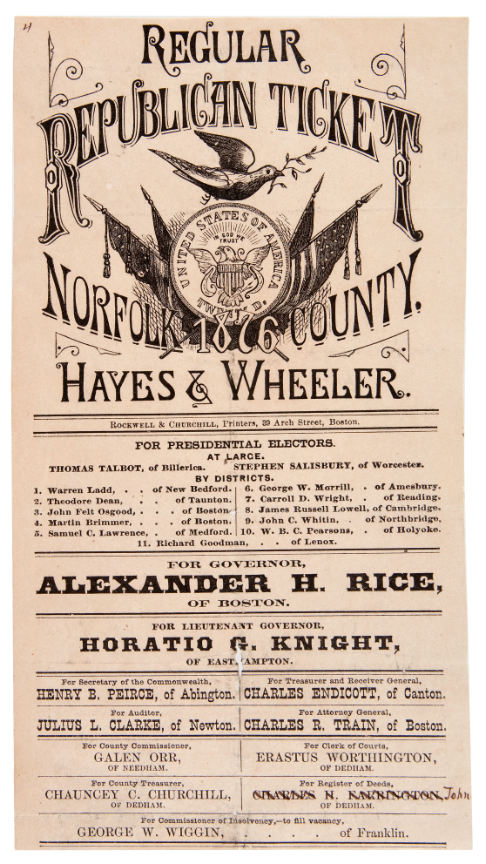“Not everything is a god that failed.” –Tristyn K. Bloom
As the votes keep rolling in from Donald Trump’s election, I wound up in an argument with a dear friend about slavery and the Electoral College. Like many of my intelligent and thoughtful liberal friends, this New York transplant has developed a deep frustration a number of established institutions and contemporary trends that underscore substantial partisan divisions in the ways different sets of Americans understand the world we share.
A lot of anti-Trump people from underprivileged backgrounds feel particularly exasperated at the insistence of an notion they consider an insult to injury. Namely, after suffering the indignity of a Trump electoral upset, they are now being pushed (by people like me) to empathize with the plight of voters within the coalition that won control of everything without them. Their irritation is probably quite similar to that of conservatives who chafed at the 2012 autopsy and the perceived defeatism and collaborationism that spawned it and a litany of harsher criticisms.
I hear them, and conservatives certainly ought to do better to reach out and engage the concerns of Blue America, as I hope we will. (I confess he’s not yet off to a great start.) But for today, perhaps the most pertinent takeaway from 2012 is that people really are going crazy, but the world is less crazy and hopeless than it seems to those in despair.
I’ve written extensively about how many Clinton voters—a clustered, urban coalition of educated whites and not-enough-minorities—were trapped in echo-chambered bubbles far removed from the vast expanse of Trump-voting America. If you haven’t yet, take a moment to look over my analysis of election demographics and deeper exploration of Trump voters’ motivations. But it’s not enough to understand what happened on Election Day and why. The project now is what happens next.
The most pressing first step is putting things back in proper perspective. Politics is fickle, and November 8 was just another election in a (hopefully) endless string of them. In 2012, Barack Obama’s reelection was like an echo to George W. Bush’s triumph eight years earlier. Both won a majority of the vote in a bitter contest against an ideologically flexible, charisma-deficient challenger on high-interest loan from the Massachusetts gentry. Each saw his respective party attain a 55-seat majority in the Senate amid rumors of permanent electoral dominance. Both majorities were embarassingly undone in the immediate next election.
While the Democratic minority will almost certainly lose seats in the Senate in 2018, they could very well take back the White House in 2020, by improving just a point or two on Clinton’s margin, and recapture the Senate in future elections. After all, it was only eight years ago that they won a supermajority. More immediately, President-elect Trump and the GOP Senate will have to negotiate and compromise with Senate Democrats to overcome the filibuster and get anything done. And there’s a lot that can be done or considered. But level heads are required.
It’s consoling to imagine Trump’s “losing” the popular vote, like Camelot’s own John F. Kennedy. Even in an election where nobody cared about or tried to win it, the popular vote could somehow indicate the limits of his electorally victorious appeal. It’s quite another to engage in revisionist history, like notoriously eccentric Yale law professor Akhil Amar (my alma mater doesn’t always send its best) and our friends at Vox, and pretend the Electoral College exists to protect slavery. Such nonsense does violence to history. In reality, the College was created with support across regions and interests for the same reason most constitutional protections exist—to protect against the ravages of direct democracy.
A popular vote for president was strongly opposed in the anti-slavery North, where delegates from multiple states described the idea as “radically vicious,” and “the great evil of cabal and corruption.” Consequently, that Massachusetts did not even put presidential candidates on the ballot in the post- and antebellum decades before 1880. Prior to that, Citizens in Massachusetts voted directly for Electoral College electors, who then voted for president, and it was up to the parties to ensure their voters elected the right people. Here’s an example from the famously contentious election of popular-vote-loser Rutherford B. Hayes in 1876:

Presidential and veep candidates are not voting options
While our leaders the American polity may be moderately less elitist today, the Electoral College remains, like our high bar for constitutional amendments, a measured check on the mercurial rapacity of direct democracy. Beyond encouraging candidates to build geographically diverse coalitions and allowing for quick, decisive victories, the system mitigates vulnerability to systemic fraud or claims of it. By contrast, a national popular would require uniform standards for voting—absentee, early, etc.—that would have to be federally centralized (a problem for conservatives), and uniformly rigorous voter ID requirements that are aggressively and meticulously enforced to the point where illegal immigrants and non-citizens would not be able to procure one (a probable nonstarter for progressives) to guard against fraud and unfairness.
Of course, the Electoral College primarily exists as an homage to the primacy of states in our constitutional system—the sovereign states, after all, created the federal government and alone have the power to amend the Constitution. So it’s not surprising that short-sighted opposition of convenience to the College (which is a bipartisan “sore losers” phenomenon) would reach its logical extreme in a movement to abolish states and thus the federalist division of power that exists for them. As one right-side-of-history writer phrased it in The Washington Post: states are “a relic of the past.”
In a bit of equal and opposite lunacy, secession is apparently cool again. Would-be rebels in California even managed to get “Calexit” (the California analogue to Brexit) trending on social media as they marched on Sacramento. Silicon Valley is even offering support for a referendum on rending the Union. Because, of course. (As any good Southerner will doubtlessly inform you, states can’t secede after Labor Day.)
But it doesn’t stop there. Reason managing editor Stephanie Slade astutely noted the Left’s pervasive insistence on making everything about racism or homophobia has really gone off the rails. This is happening even as the left-wing partisans at Vox are acknowledging that shouting, “Bigot!” at people is a marvelously poor way to combat bigotry.
Let’s take a deep breath.
I realize progressives and other anti-Trump partisans are tired of being told to calm down and just accept that President-elect Trump will become President Trump. I realize that many do sincerely think him a unique danger to the American project and the well-being of their peers. I’m not going to argue down every point or defend the wrongs affixed to Trump’s public record. I will, however, remind you to keep things in perspective.
A year ago, when we all knew more or less as much about Trump as we do now—i.e., every issue that arose thereafter was, as I’ve quoted before, hardly surprising but freshly disappointing—the future Trump antagonists didn’t think him so bad on the merits. In fact, as my friend River Tam noted recently, folks on the Left spend the last year and change telling us that Marco Rubio, Ted Cruz, John Kasich, and Mike Pence were all no better (or worse!) than Trump.
For just a sampling, you can just read (for the the following URLs ranging from Salon and Vox to the Washington Post and CNBC.
Rubio:
http://www.vox.com/2016/2/20/11067932/rubio-worse-than-trump
http://www.cnbc.com/…/rubio-cruz-scarier-than-trump-investo…
Cruz:
https://www.washingtonpost.com/…/00a425fa-a360-11e5-9c4e-be…
http://www.salon.com/…/ted_cruz_is_worse_the_only_thing_sc…/
http://www.usatoday.com/…/cruz-trump-not-viable-c…/82718646/
Kasich:
http://www.salon.com/…/stop_mooning_over_john_kasich_hes_n…/
http://www.vh1.com/news/259050/cruz-kasich-trump-the-same/
Pence:
http://thehill.com/…/300052-warren-pence-no-better-than-tru…
https://www.thenation.com/…/trumps-vice-presidential-pick-…/
http://www.sacbee.com/…/…/erika-d-smith/article89702297.html
If even John Kasich, this cycle’s Jon Huntsman but with more sanctimony and less economic conservatism, is the same or worse than Trump, then our new reality-show commander-in-chief is hardly a unique threat to the Republic. The absurdity and hypocrisy of this blanket leftist hysteria against Republicans is not lost on more critical observers:
In February, Jonathan Chait, a writer for New York magazine and the author of a forthcoming book explaining how super-terrific Barack Obama’s presidency was, wrote a piece titled “Why liberals should support a Trump Republican nomination.” He listed three reasons: Trump would lose, Trump would wreak havoc on the GOP, and Trump would be better than the other Republican candidates.
“If he does win,” Chait wrote, “a Trump presidency would probably wind up doing less harm to the country than a Marco Rubio or a (Ted) Cruz presidency. It might even, possibly, do some good.”
The day after the election, Chait declared on Twitter “This is the worst thing that has happened in my life.”
Okay, then.
Shortly after the election, Slate’s Jamelle Bouie wrote a piece titled “There’s no such thing as a good Trump voter,” likening some 60 million Americans to a racist lynch mob. Last year, Bouie penned an article with the headline “Donald Trump is actually a moderate Republican.”
Of course, Chait and Bouie are not alone. Progressive figures such as Paul Krugman, Matt Yglesias, Robert Borosage, Amanda Marcotte, and Bill Maher all said during the primaries that Trump was less scary than, say, Rubio or Cruz. (See Warren Henry’s excellent survey in The Federalist for details.)
Moreover, Trump’s history of left-leaning politics is arguably at least as great a concern for conservatives as for liberals—he’s already pushing massive infrastructure spending, because somebody has to show Bush and Obama how to make borrow-and-spend budget disasters great again. Democrats (backed by welfare-corporatists) may well end up aligning with Trump to fight conservative Republicans on such priorities, just as Republicans aided Obama in beating back progressive Democrats’ opposition to free trade.
One of the reasons the conservatives who opposed Trump seemed so quick to get over his upset win is that we simply had more time to mourn. Cruz and Kasich dropped out of the race a half-year ago. Other preferred candidates bowed out months earlier. Even the most stalwart opponent of Trump (and presumably Clinton) from the Right has had a long time to prepare for the disappointment that was inevitable with this election. Jonah Goldberg might have channeled the beating heart of movement conservatism when he said of the general election, “This ends in tears no matter what. Get over it.”
That was eight months ago.
Eight months from now, I expect many more heads will have cooled on the Left, as well. That’s not to say progressives (or conservatives) will or should forget the darkness that pulsed through Trump’s campaign appeal. That’s not to say that anybody should drop principled objections to the many concerning statements Trump made since bulldozing his way into the race last summer. Or blithely ignore disturbing characteristics of his advisers or policies. Compromise of your integrity is no more necessary to engage Trump than to engage any president or politician.
However, the cultish conviction that Trump can be denied normalizing is a shibboleth of denial. He won the election; he is going to be president. He is already normalized. That ship is out to sea. Accepting reality for what it is, Italian immigrant Luigi Zingales offered invaluable insight on engaging Trump through the parallel of Italy’s charismatic yet scandalous billionaire playboy former Prime Minister Silvio Berlusconi:
Mr. Berlusconi was able to govern Italy for as long as he did mostly thanks to the incompetence of his opposition. It was so rabidly obsessed with his personality that any substantive political debate disappeared; it focused only on personal attacks, the effect of which was to increase Mr. Berlusconi’s popularity. His secret was an ability to set off a Pavlovian reaction among his leftist opponents, which engendered instantaneous sympathy in most moderate voters. Mr. Trump is no different.
We saw this dynamic during the presidential campaign. Hillary Clinton was so focused on explaining how bad Mr. Trump was that she too often didn’t promote her own ideas, to make the positive case for voting for her. The news media was so intent on ridiculing Mr. Trump’s behavior that it ended up providing him with free advertising.[…]
The Italian experience provides a blueprint for how to defeat Mr. Trump. Only two men in Italy have won an electoral competition against Mr. Berlusconi: Romano Prodi and the current prime minister, Matteo Renzi (albeit only in a 2014 European election). Both of them treated Mr. Berlusconi as an ordinary opponent. They focused on the issues, not on his character. In different ways, both of them are seen as outsiders, not as members of what in Italy is defined as the political caste.
From here on out, the only way conservatives or progressives are going to do battle with whatever bad ideas will emerge from the Trump administration—and win support for good ideas from the people and in Washington—is to move beyond personality and identity politics to a contest on the merits of policy. The more that Trump is treated like an ordinary president who won an ordinary election through ordinary voters with ordinary interests, the easier it will be to bring his star back to Earth and subdue his nuttier proposals on the merits. By and large, conservatives in Washington and beyond the Beltway seem to have learned this lesson through months of preparation. Perhaps, at some point, our progressive friends will, too.
In the refreshingly measured words of a retired left-wing satirical pundit:
I don’t believe we are a fundamentally different country today than we were two weeks ago. The same country with all its grace and flaws, and volatility, and insecurity, and strength, and resilience exists today as existed two weeks ago. The same country that elected Donald Trump elected Barack Obama.
Every so often, even Jon Stewart is right. If not, then perhaps, as a former Democratic candidate for my congressional district in Virginia proclaimed in the wake of Trump’s election, the “Democratic Party deserves to die.” But America is not dying; we will survive the night.
This is not the end of all things. Just the end of another beginning.



November 19, 2016 at 1:44 pm
Always enjoy your posts. The obsession with personality goes both ways. You never hear about policy any more, but only “he’s a racist”‘ and “she’s a liar.” The Jerry Springer model of modern journalism (and campaigning) has become the norm. For a point of view similar to yours but from a liberal orientation, try mine 🙂 Gary, https://shakemyheadhollow.wordpress.com/2016/11/16/trump-completes-the-circle/